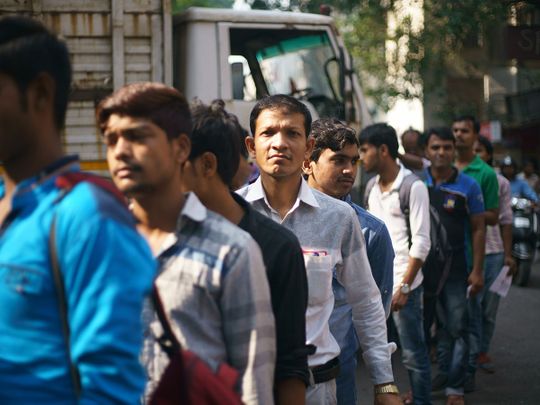
It is the elephant in the room and as a recent incident shows, sooner rather than later it will have to be given the absolute attention that it demands. India’s unemployment debate ratcheted up many notches in the past few days after a firm in the state of Gujarat advertised for 10 vacancies.
To say the response, it received was overwhelming would be an understatement. 1800 candidates reportedly showed up for the interview and amid the jostling, a stampede-like situation led to people even falling off the railing.
The incident comes in the backdrop of reports that students from IIT where India’s most elite graduate in engineering, are no longer assured of corporate placements. In the past IIT students were almost certain of lucrative packages merely with the name of the institution as a stamp, a reason why aspirational India has always made a beeline for IIT colleges.
Things though are no longer kosher. Recent data shared by an alumnus reveals that 38% of students across 23 campuses have not been placed this year. This roughly translates to about 8000 students, a figure that is almost double that of the preceding year.
It also leads to a worrying trend of India not maximising the advantage of having a robust working-age population, 66% of Indians are under the age of 35 making it one of the youngest countries globally.
Not a new refrain
Although the government has questioned a report by banking giant Citigroup which says that even with a 7 per cent growth rate India will struggle to create sufficient employment opportunities, that all is not well when it comes to the country’s youth and jobs is not a new refrain.
The Citigroup report recommends the government generate nearly 12 million jobs annually in the coming decade for new entrants into the labour force. Moreover, it also flags the quality of jobs that are being created in the country and the lack of skill-based emphasis.
On its part, the government says the report fails to account for ‘comprehensive and positive employment data’ available from official sources. But that has not stopped the opposition from once against putting the ball in the government’s court and questioning the lack of job opportunities in the country.
It has questioned the Prime Minister over his statement that 8 crore jobs were created in the last 3-4 years calling it some ‘artful statistics jugglery.’ India’s job crisis is a burning issue, one that pushed even the highly emotive issue of Ram Mandir to the sidelines during the elections in which the BJP failed to win an outright majority. Its tempo has only risen since then.
Flagging rising joblessness
Nor is this job crunch merely anecdotal, there have been other reports as well flagging rising joblessness. The Centre for Monitoring Indian Economy (CMIE), a private think tank that tracks India’s unemployment graph pegged it at an eight-month high of 9.2 per cent in June 2024.
The slew of welfare schemes announced by the government will remain handicapped if they fail to show benefits among the labour force. Vacancies in fields such as education are glaring with the report highlighting how female unemployment in the country is now more than the national average.
India’s nationwide medical entrance test NEET (National Eligibility cum Entrance Test) was suspended amid allegations of corruption and paper leaks leaving the future of 24 lakh students uncertain. The government’s Agniveer scheme announced in 2022 has also been embroiled in controversy.
Contrary to ageing populations in economies like Japan, or even China with its shrinking workforce, India is in the driver’s seat but is throwing away the advantages of the ‘demographic dividend.’
Half of India’s population is under 30 and primed for grasping opportunities. Unfortunately, a large percentage is hitting the wall, 83 per cent of India’s unemployed are the youth as per the India Employment Report 2024.
The Union Budget for the fiscal year 2024-25 will be presented this month. Will there be anything to bolster the youth by addressing head on the unemployment crisis? Flinging numbers around is pointless unless it is backed up with measures on the ground.
Else, India can lay claim to being one of the fastest-growing economies of the world, but will also be battling rampant unemployment.









